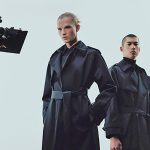Nearly every man who played sports as a boy knows the name Russell. Chances are Russell Corp. made his Little League uniform, the practice gear, the lounging socks. Even his school uniform may have carried the Russell “R.”
But now the venerable Southern maker of active wear is after a bigger following.
Women, Russell wants you.
The company, founded a hundred years ago to sew garments, is also bidding to emerge from the shadows of the shoe people — the Nikes, Reeboks and Adidases of the world.
It is not like Russell is a struggling little guy, battling to be seen, however.
The billion-dollar company, founded in 1902, offers a smorgasbord of goods that serve the sports and athletic world. Founded in little Alexander City, Ala., and now headquartered in metro Atlanta, Russell is now international.
Professional players from Turner Field to Yankee Stadium, as well as people who play weekend hoops or touch football, don Russell wear.
And the company directs every step of the manufacturing process, from weaving raw fibers into fabric to dyeing, cutting and sewing the fabric into sweat shirts, sweat pants, T-shirts and tank tops that it sells through retailers and other companies.
Looking to new ways to grow, however, Russell has turned its attention to women, whose presence in the world of professional and collegiate sports is growing. Women also are playing leisure sports more.
“We believe in the women’s market,” said Rod McGeachy, Russell vice president for marketing.
“Though women constitute only 30 percent of the market in our area of sportswear, they are a growing segment of customers who believe more in participation than men do.”
Toward that end, the company has emphasized new products for women as players, McGeachy said, paying special attention to comfort factors, including high-tech materials that move moisture away from the body during active sports, thus keeping the player cooler and fit to exercise longer.
African-Americans, who have a higher-than-average affinity for the Russell label and brand, are also being courted, particularly through efforts to open stores in city neighborhoods, McGeachy said.
Securities analysts agree on the primary strengths of Russell. Though the company may have avoided — or missed the boat — in embracing the glamour of high-profile celebrities and electronic advertising, it has succeeded in other ways. It has a reputation for quality and dependable service, in product and the way it deals with customers. That is a major plus with teams, coaches and players the company serves.
“We have been very impressed with their new marketing direction, as well as the solid reputation for quality and maintaining a respect for their traditions,” said Nathan Lewis, an analyst for Jackson Securities in metro Atlanta.
“They exceeded our expectations for the last three quarters,” he said, “and they do it with solid and experienced management.”
Those managers include two veterans from the industry. There’s Chairman and Chief Executive Jack Ward, who over the last several decades has worked as product manager for Procter & Gamble, H.J. Heinz and most recently Hanes, where he was the Leggs specialist. Backing him is Jonathan Letzler, the president, who also comes from Hanes experience.
But it’s not enough to be just a hot marketer in the go-go global quest for growth. It takes operating efficiency, too.
With profits squeezed through competition with smaller, sleeker players with lower overhead, Russell has reorganized boldly in the last several years.
In an attempt to stem the tide of lower earnings, Russell has moved more of its manufacturing overseas, a move the company made late in the game and without enthusiasm, said McGeachy.
“We think it is a tribute to the company that we were among the last to move manufacturing abroad, despite cost pressures,” he said.
The company still is not insulated from lower-cost competitors, executives and analysts agree. And Russell remains under pressure to show profitability. Figures are not yet out for fiscal 2002, which ended Dec. 31. But the company was battling back from 2001, which saw a dip in revenue and a net loss of more than $55 million on revenue of $1.16 billion. Quarterly reports last year showed improved performance from the previous year.
A huge proportion of the company’s sales, especially in the high-volume active wear market, is through retailers like Wal-Mart, Sports Authority and others, where it knocks heads with a variety of manufacturers who use overseas production, from Fruit of the Loom to Nike.
“As the (trade-liberalizing) NAFTA agreement unfolds, with China coming more heavily into our markets, we must aim to protect our share,” said McGeachy.
The promotion of the brand through sponsorships is one of the strategies.
A major part of that strategy has been focused on women, the new and growing market.
“Women play more organized sports,” said Ward, the CEO. “Just as important, we are aware that women make a large portion of the purchases of active wear, for themselves as well as for the children and their husbands.”
In part to catch the eyes of women, Russell has been working with groups like female sports coaches, Ward said.
And in March, Russell will sponsor the NCAA Final Four of women’s basketball in Atlanta. It also sponsored a women’s college basketball event in Atlanta last month.
Change isnt new for the old-timer, which was first known as Russell Manufacturing Co.
The company started 100 years ago with weaving and sewing machines that turned out women’s dresses and clothes.
It was not until the mid-1930s that the company turned to athletic wear, and as it continued to grow through acquisitions, the company expanded its offerings to uniforms for basketball, baseball, football and other sports, including Olympic ones.
The one thing Russell has not done in recent times is rely on endorsements by major sports stars, as Nike and the shoemakers do.
“We have preferred to work with teams and coaches associations,” said Ward, “but we do not discount the possibility of changing.”
















